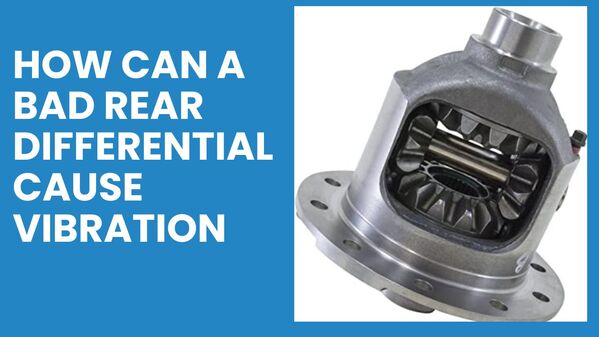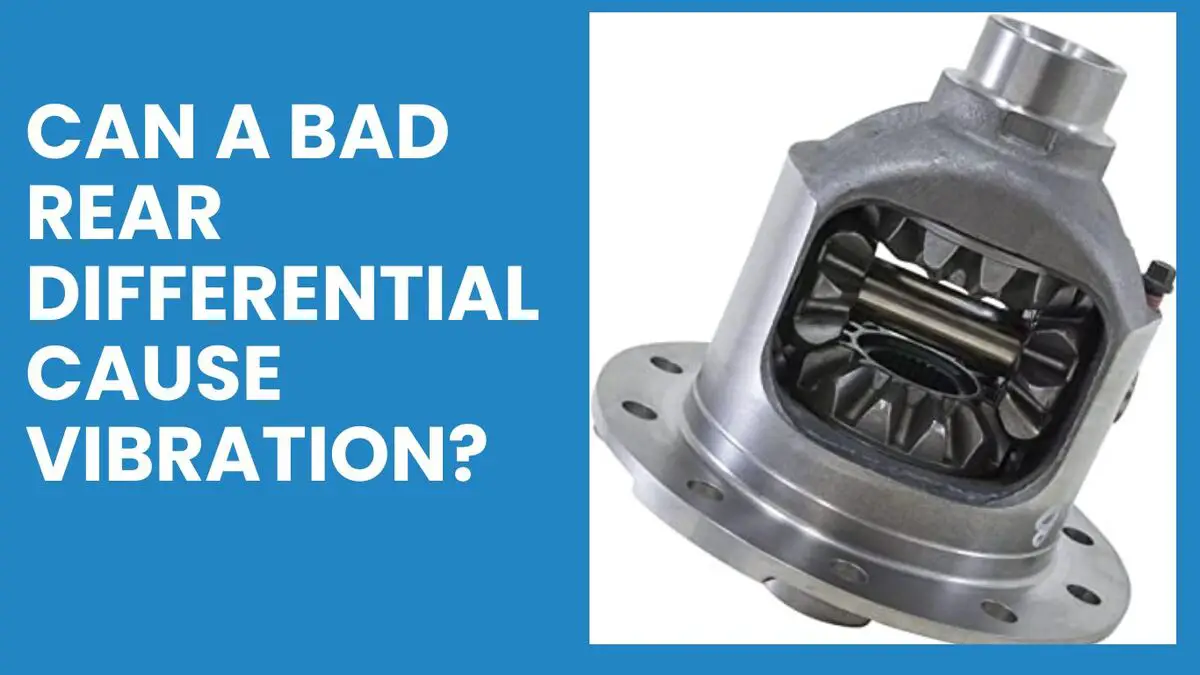Did you notice rapid vibration coming from the rear end of your vehicle while cornering or turning? Why does this happen? It happens due to many reasons including imbalanced tires and wheels, damaged universal joints, axle bearing failure, etc. But can a bad rear differential cause vibration?
Well, a faulty rear differential can easily create vibration in many ways. First, it receives the power from the engine and transmits power to the wheels to spin differently. But when it gets bad, there may be a lack of lubrication or the teeth may break. As a result, it produces vibration and noise.
However, if you are stuck dealing with the vibrated differential and find a way to eliminate this hassle, this guide will help you. Here we’ll discuss how bad differentials cause vibration and how to get rid of them with bonus tips.
How Can A Bad Rear Differential Cause Vibration: In-Depth Guide

In this section, we’ll discuss how a worn-out or broken rear differential creates unwanted vibration. There are some intriguing reasons behind producing vibration. One of the most common faults is the lack of lubrication. Here are other matters to know.
Number #1: Unsuitable Lubricants
Differential fluids are the essential objects to lubricate the differential properly. By lubricating properly, the differential works fine. But what happens if you put the wrong differential lubricants?
Well, it causes the differential to work less effectively and produce strange sounds and vibrations. Using the wrong fluid is considered the leading cause of differential wearout. When you use low-quality or unsuggested differential fluid, it builds up corrosion or rust. Consequently, the differential may be stuck or locked, which causes the wheels to turn less than minimally. Thus, the tires will rotate badly and create vibration.
Number #2: Worn Out Or Broken Pinion And Ring Gears
Ring and pinion gears are essential to deliberately deliver power to the wheels. But when these gears start to malfunction or break completely, the wheels don’t get enough power and produce vibration throughout the vehicle.
Also, you’ll notice a howling or whining noise while accelerating even at lower speeds. These gears break due to many reasons including overloading, heavy-duty use, pinion misalignment, etc.
Possible Solution: As soon as you detect the problem, be in a hurry to repair these. You can get assistance from a qualified automotive expert to resolve or repair the pinon and ring gears.
Number #3: Lack Of Lubrication
Proper lubrication is crucial to keep the differential always efficient. When the differential fluid level is below the standard, the rear differential can’t rotate faster and sit idle.
As a result, the differential teeth grind hard and create vibration. It’s common to work hard when the system fails to deliver the right amount of fluid to the differential.
Consequently, the differential needs to work more to provide enough power to the wheels so that they can rotate at the same speed or rate, especially during cornering. In some cases, the teeth will break completely.
Possible Solution: Always try to put the fluids when required. Don’t forget to put in the right fluids at the right time. Never drive the vehicle with little differential fluids or lubricants left.
Number #4: Broken Teeth
Another way the broken or bad rear differential causes vibration is there are broken teeth inside. When the teeth of the differential are blown out completely, it can’t rotate evenly, which is a great culprit. Simply put, broken or damaged differentials have broken teeth. In addition, if there is a faulty driveshaft, you’ll notice the wheels turn inaccurately while cornering or turning. It affects the overall driving experience and limits control over the car.
Possible Solution: When you notice and seem to have issues with the driveshaft, take action immediately. Schedule a service to a renowned garage. Otherwise, it will damage the entire drivetrain parts.
Number #5: Uneven Tire Wear
The tire is one of the most critical components of any vehicle. To maintain enough force or pressure that is provided by the differential, tires need to do extra work which in turn causes premature tire wear. In the meantime, it can cause the suspension to fail which will also affect the tire.
Possible Solution: You should minimize the premature tire by replacing the broken differential. If the differential doesn’t break and requires fluid, put the exact differential fluids to keep the continuity of a differential. It’s advisable to get services from a qualified mechanic.
Number #6: Broken Universal Joints
U-joints or universal joints are crucial components that link up the differential and the driveshaft. Often, they connect two driveshafts together or driveshafts to the transmission. It allows the driveshaft to move side by side. But when they get broken or fail completely, they are unable to connect accordingly. Or if the bearings of each end break completely, it’s impossible to create the driveshaft’s natural movement. When the natural movement doesn’t achieve, it causes vibration.
Possible Solution: In this case, you should perform a test to examine if there is an issue or not. If exists, it’s a good practice to change the entire u-joints to get a good result.
Number #7: Leaking Differential Fluids
Another common cause of why bad differential creates vibration is continuously leaking fluids. When fluids leak, the differential can’t get the required fluids to perform the way it should. As a result, the differential teeth can’t engage perfectly and rotation will collapse. And unfortunately, you hear vibrations from behind or feel the entire car vibrate.
Possible Solution: Inspect the gasket, pinion seal, and differential side panel seal. Often, these seals could leak and leak fluids then. If you find any leak inside, take immediate action or consult with an expert.
Final Verdict
We all know differential is a crucial mechanical component that helps the drive wheels to rotate same speeds at different rates. During cornering, one wheel gets slower than another. But this routine task can’t be done if the rear differential is bad. A worn-out differential creates many problems like grinding or whining noise, leaks of oil or fluid, etc.
A bad rear differential causes vibration as well. How? You will hear driveline noise and vibrations if the differential goes bad. Here we discuss how can a bad rear differential causes vibration and possible solutions.
More resources:
